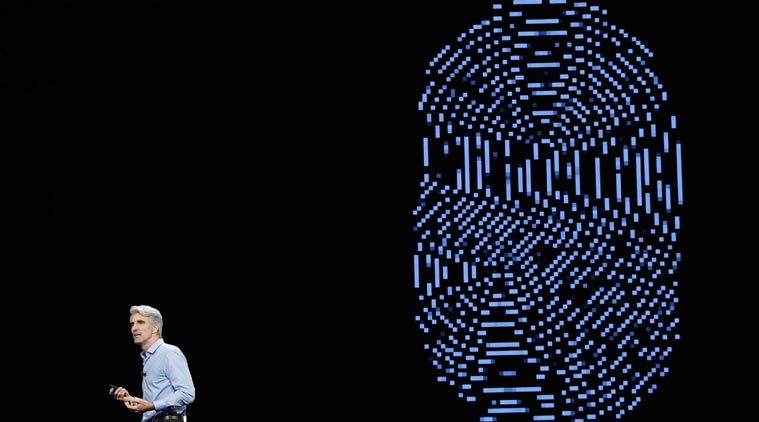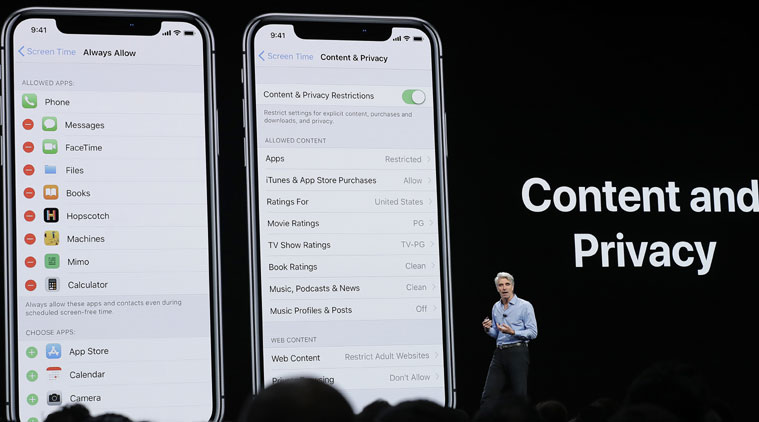 Apple iOS 12, macOS Mojave will make it harder for Facebook to track you. In this photo, Appl SVP Craig Federighi talks about security, privacy on iOS 12 and macOS. (Image source: AP)
Apple iOS 12, macOS Mojave will make it harder for Facebook to track you. In this photo, Appl SVP Craig Federighi talks about security, privacy on iOS 12 and macOS. (Image source: AP)
Apple’s iOS 12 and macOS Mojave come with features, which will make it harder for social networks like Facebook, and online advertisers to track users based on their browsing habits. Apple announced the features as part of improvements to Safari. Both iOS 12 and macOS Mojave come with renewed focus on user privacy and security.
The announcements were made at WWDC 2018, even as a report in The New York Times showed that Facebook had data deal partnerships with companies like Samsung, Apple, Microsoft, and even Chinese telecom players like Huawei, Lenovo, etc. Apple on its part has denied that it got any data from Facebook.
According to the iOS announcement, Apple is adding enhancements to prevent tracking of users. This will ensure that Share, Like buttons and comment widgets on web pages cannot be used to track a user without their permission. Of course, these apply in Safari, Apple’s own web browser. For those who are not aware, Facebook-powered comments, Like, Share buttons on web pages can be used to track people. This applies even if a user does not have a Facebook account or are logged out of their Facebook account from the Safari browser.
Apple says Safari will also stop advertisers from collecting their device’s unique settings. This will be done to ensure that advertisers cannot retarget ads to the user across the web. Apple’s Senior VP of software engineering Craig Federighi explained in the keynote, “With Mojave we are making it much harder for data companies to track users by creating fingerprints,” he said. In this case, advertisers, data companies create a fingerprint of the device based on configurations, the fonts installed, the plug-ins installed and use that to target customers.
Mojave in contrast will show websites a simplified system configuration, only built-in fonts and legacy plug-ins will not be supported, so that they cannot contribute to the data-tracking. Apple says Safari will present, “simplified system information when users browse the web, preventing them from being tracked based on their system configuration.”
 Apple says Safari will also stop advertisers from collecting their device’s unique settings.
Apple says Safari will also stop advertisers from collecting their device’s unique settings.
Additionally, apps which require access to the Mac camera, microphone, or access Mail History, Messages will need to get user permission before carrying out this action on macOS Mojave. Currently this need to ask for permission was limited to Location, Contacts, Photos, Calendar and Reminders. Safari on macOS will also prevent social media Like buttons, Share buttons, or comment widgets from tracking the user similar to how it will work on iOS.
Earlier, Apple CEO Tim Cook had said in a statement to NPR that the company got zero-data from Facebook as part of the data-sharing deal. Cook said Apple was never in the data business. “The things mentioned in the Times article about relationship statuses and all these kinds of stuff, this is so foreign to us, and not data that we have ever received at all or requested — zero,” he was quoted as saying.
Apple iOS 12 and macOS Mojave will be available for download this fall, which is in September. Apple rolls out the new software after revealing its new iPhones, and other hardware in early September. Apple will release a public beta for both software later this month.